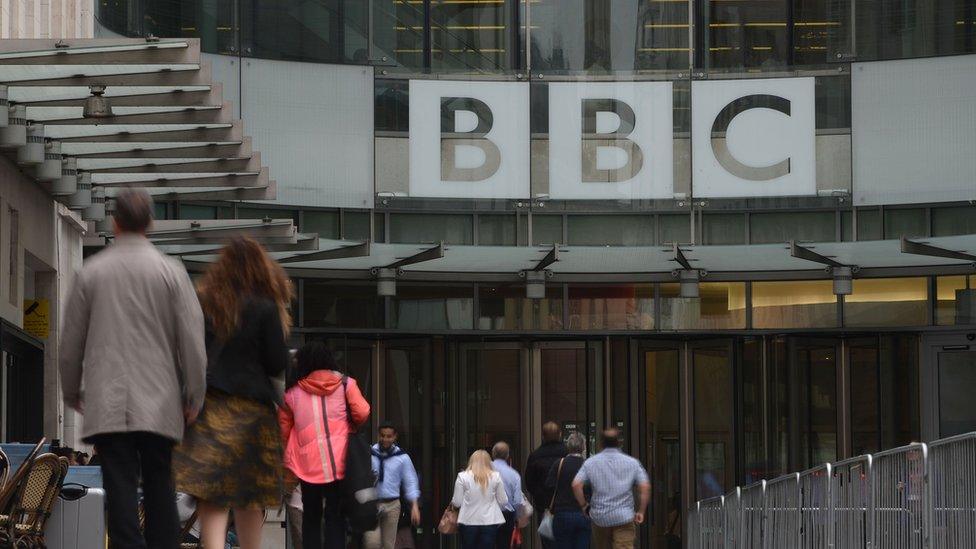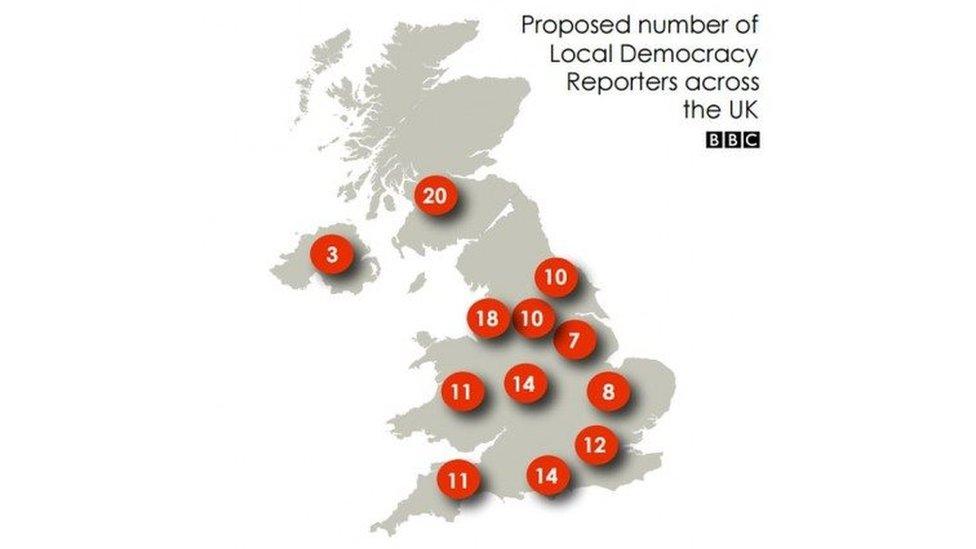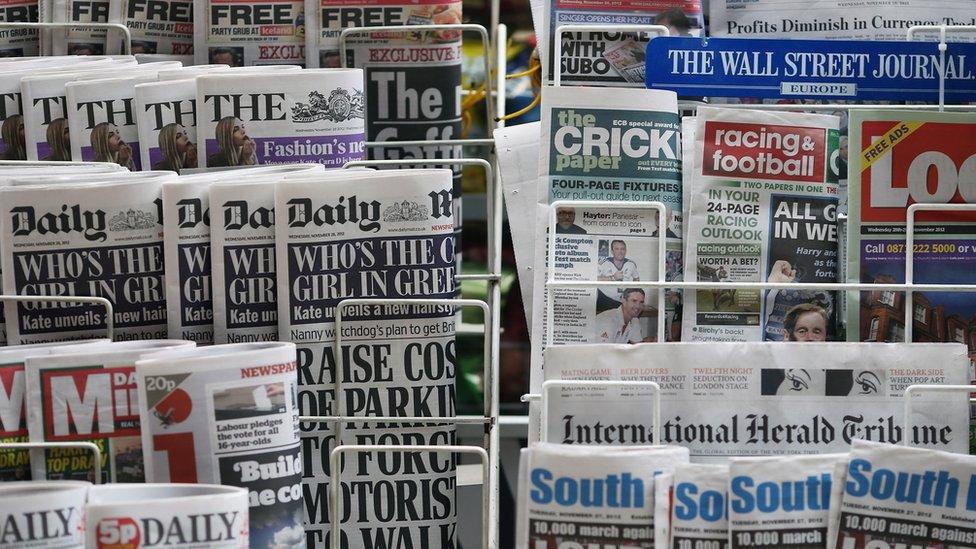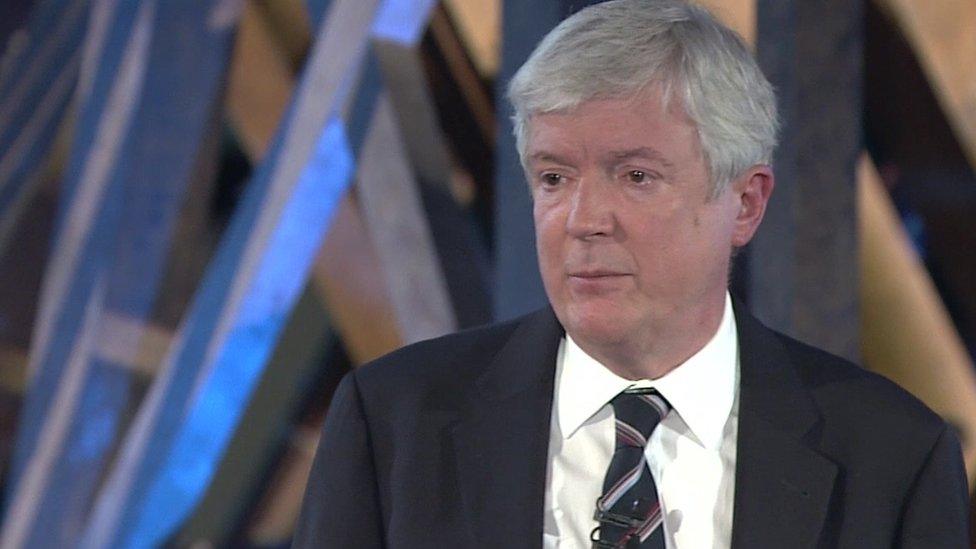BBC-funded local reporters to be spread across UK
- Published

The BBC has released details of where licence fee-funded local journalists will be based across the country, with jobs being phased in from the summer.
It has set aside £8m a year to pay for 150 reporters, who will work for local news organisations rather than the BBC.
The journalists will cover council meetings and public services and share their stories with the BBC.
James Harding, director of BBC News and Current Affairs, said it would strengthen local news coverage.
"As more power is devolved across the UK, it's more important than ever that we cover, understand and hold to account local politicians and public services," he said.
So far, the BBC has allocated 20 reporters in Scotland, three in Northern Ireland, 11 in Wales and 104 in England, with plans to place the full 150 journalists by 2018.

How the scheme will work
The reporters, who must work for a "qualifying" regional publisher, will be responsible for local newsgathering and sharing their stories with the BBC.
To qualify, local titles must demonstrate they have a "previous track record, external" of public service journalism, as well as the ability to employ staff.
But the "exact nature of the reporters' duties in Northern Ireland is still under discussion", the BBC said.
In addition, the BBC will share audio and video material, after it has been transmitted, with local publishers under its NewsBank service, launching later in 2017.
It will also create a hub for data journalism, funded by the BBC with staff from local titles, with recruitment beginning in the spring.

Reporters in Scotland, Wales and Northern Ireland

Scotland: North Scotland (4), central Scotland (4), Glasgow and the West (4), Edinburgh and the East (4), the Borders and south-west (4)
Northern Ireland: 3
Wales: North Wales (3), south-west Wales (2), Cardiff (3), Newport (3)
Elsewhere in the UK:
North East: Tyneside (4), Wearside (2), North Yorkshire (2), Teesside (2)
North West: Lancashire and Cumbria (5), Cheshire (2), Merseyside (4), Isle of Man (1), Greater Manchester (6)
Yorkshire: Humber (1), West Yorkshire (4), South Yorkshire (5)
West Midlands: Birmingham and Coventry (5), Black Country (3), Worcsestershire and Herefordshire (2), Staffordshire and Stoke (2), Shropshire (2)
East Midlands: Derbyshire (1), Lincolnshire (2), Nottinghamshire, Northamptonshire and Leicester (4)
South West: Bath, Somerset and Gloucestershire (4), Devon and Cornwall (3), Wiltshire (2), Dorset (2)
South East: Buckinghamshire, Berkshire and Oxfordshire (6), Sussex (3), Kent (2), Hampshire and Surrey (3)
East: Cambridgeshire, Hertfordshire and Bedfordshire (4), Essex (2), East Anglia (2)
London: 12
Source: BBC report, external

Why is it being introduced?
The plans, introduced with the BBC's new charter in 2017, come as local newspapers continue to face falling print readerships and advertising revenues.
According to ABC circulation figures, covering the six months to June 2016, the majority of local titles recorded falling year-on-year sales, including the Brighton-based Argus (down 10.3%) and Manchester Evening News (down 14.1%).
Last May, the BBC and trade body the News Media Association (NMA), which represents local and national newspapers and publishers, outlined a plan to create 150 so-called "local democracy" reporters.

NMA chair Ashley Highfield said the move would "enhance democracy" in the British regions, while also keeping up "competition between different news sources".
He had previously criticised separate BBC plans to hire around 100 local reporters to work with local newspapers, outlined in 2015.
Mr Highfield had said that the scheme, where news publishers including the BBC could compete for reporting contracts, would recruit "more BBC local journalists through the back door".
In a blog post, Matthew Barraclough, the BBC's journalism working group editor, said "every part of the sector" had played a part in developing the new plans.
"I believe what we've agreed will extend the reach of BBC journalism and help support local news generally," he said.
- Published7 September 2015
